As a young seminarian, I spent some time in Germany studying German. There in Bavaria, I was impressed by the fact that, in the center of each of the villages, there was a small replica of the Berlin Wall with a sign that read in German, “A wall divides the German people.” Like so many, we never thought that that wall would come down. And then it did.
I have been at every March for Life since the very first one when I worked to organize it with Nellie Gray. In the years since, I have often reflected on the fact that I would likely not live long enough to see the Roe v. Wade decision overturned. Yet, today I see that it has happened. For me, it is a sign of the power of prayer in our world.
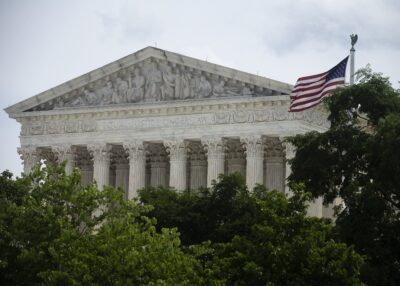
I know this is a very challenging time in our country, with so much division and polarization but I am convinced that many, many children will be spared because of this decision. But our work is not done. It is not enough to change the laws; we need to change people’s hearts, try to heal divisions, and work for a more just society. One of the causes of so many abortions is the economic injustice that exists in our world. The more we can do to overcome those injustices and grueling poverty that some people experience, the more we will make the world safe for children in the womb and help women whose lives lead them to these dark decisions.
So, I don’t think our attitude should be at all triumphalist but one of prayer and commitment to continue working for the protection of all human life at every stage.
With that in mind, I’d like to share with you the statement I issued earlier today:
For all of us who have spoken, written, worked, marched, and prayed to reverse Roe v. Wade, today’s Supreme Court’s decision in Dobbs v. Jackson is deeply significant and encouraging. This decision will create the possibility of protecting human life from conception; it calls us to recognize the unique burden faced by women in pregnancy; and it challenges us as a nation to work together to build up more communities of support — and available access to them — for all women experiencing unplanned pregnancies.
During the past half-century, as the abortion debate continued, the Catholic Church has often been accused of imposing a religious belief on our pluralistic society. It is indeed the case that, when addressing the Catholic community, the Church has used both religious and moral arguments to oppose abortion. But when engaging the wider American civil society, elected officials, and our legal system, the Church has defended human life from its inception as a matter of human rights. Our continued efforts in advocating our position on the protection of unborn children is consistent with our advocacy for issues affecting the dignity of all persons at all stages and in all circumstances of life. The Church employs this principle of consistency in addressing issues of race, poverty, and human rights generally. It is a position that presents a moral argument as a foundation for law and policy to protect human life.
I welcome the Court’s decision, but I do not underestimate how profoundly divisive the issue of abortion has been and will continue to be in our public life. Even more tragic has been the personal suffering of women facing unplanned pregnancies in difficult situations. The Church has consistently opposed the moral and legal dimensions of Roe v. Wade; we also adamantly reject stigmatizing, criminalizing, judging or shaming women who have had abortions or are considering them. Too often isolated and desperate, women have felt they had no other choice. They need and deserve spiritual, emotional, and material support from the Church and from society.
In the Archdiocese of Boston, we have sought, through Project Rachel and Pregnancy Help, to support women facing a crisis pregnancy and women whose lives have been impacted by an abortion. In addition, the Church offers the Lord’s boundless mercy and healing to those suffering from the spiritual harms of abortion. In the face of recent statistics indicating an increase in abortions, our pastoral and social support for women will continue, will be welcoming, and will be available to all who need them.
Today’s Supreme Court decision begins a new chapter in our legislative and legal forums as the public debates about abortion will not end. Since 1973, there has been continuing opposition to Roe v. Wade’s reasoning and its consequences. Those consequences have permeated the political, legal, and social fabric of American life. The radical character of the Roe decision catalyzed some of the deepest reactions and responses to any issue in our nation’s history. The public arguments will now shift to the states, the Congress, and the courts. It is my hope that this new chapter may be a time of a different tone and focus in our civic life.
First, we must adopt a wider vision of the multiple threats to human life in our society today. The recognition that human life begins with conception and continues through natural death. All human life deserves moral and legal protection at all times. Protection of life should be comprehensive, not selective. The Church, in its own positions, should reflect this wider vision, and we are called to engage our civil society around this more holistic view of the value and dignity of human life. It is commonly recognized by those on both sides of the abortion debate that conditions of poverty and injustice have been and are today a major factor contributing to abortions. Those who have opposed and supported Roe can and should find common ground for a renewed commitment to social and economic justice in our country.
Second, protecting human life at all times can only succeed if we rediscover the value of civility in discourse, in protest, and in policy advocacy. Respect for life calls for mutual recognition of and respect for our common dignity as persons and citizens. In recent years, the idea of civility and respectful discourse has suffered from neglect, as has the respect for human life. The renewal of both is possible and urgently necessary.
As a bishop and a citizen, I hope and pray we can create a culture that protects the most vulnerable at the beginning of life and at any time life is threatened in any way.
Last Friday, we had two events for youth and young adults at the Cathedral of the Holy Cross in anticipation of our Eucharistic Congress the following day.
To start the evening, in an event co-sponsored by the archdiocesan Office of Evangelization and Discipleship and Young Catholic Professionals Boston, I was joined by Bishop Flores and Deacon Harold Burke-Sivers for an engaging question and answer session with the more than 200 young adults and professionals gathered in the lower church.
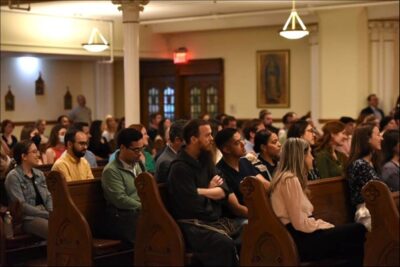
Moderated by our Vocation Director, Father Eric Cadin, the discussion responded to questions submitted by those gathered during the prior hours gathering of food, drink, and fellowship. The questions ranged from prayer and faith to current cultural and moral issues. It is was joy to be with so many young Catholics gathered that night and representing the hundreds of thousands of Catholic young people throughout the archdiocese who are hungering for faith, inspiration, purpose, and Jesus.
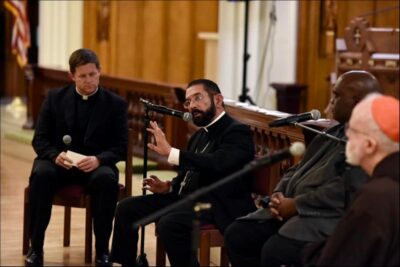
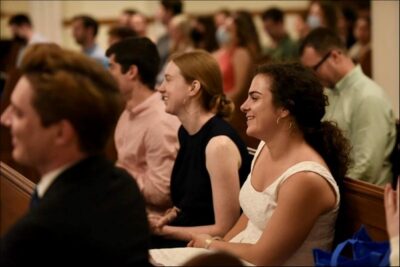
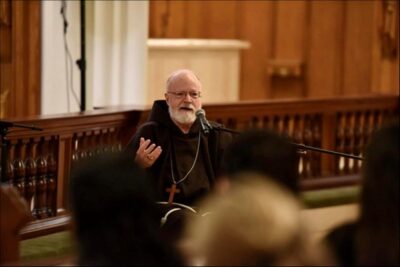
Following the gathering in the lower church, the main event began in the upper cathedral. This, too, was wonderfully planned and organized by those within the Archdiocesan Secretariat of Evangelization.
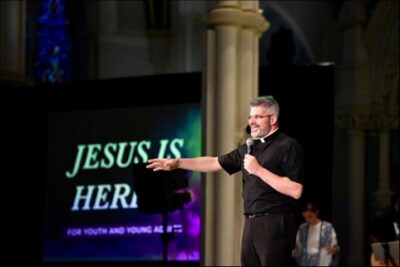
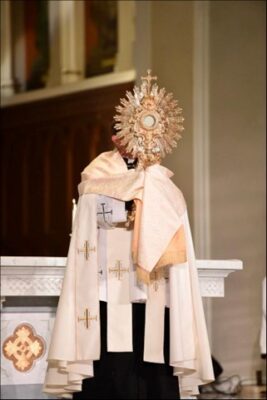
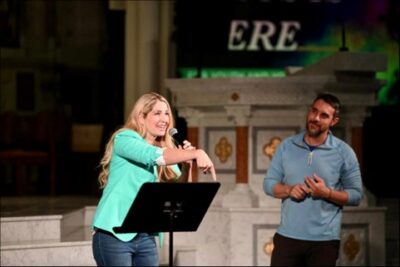
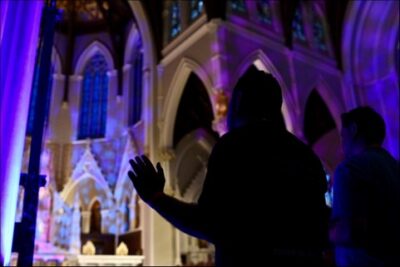
Our vigil gathering of Youth and Young Adults was emceed by Father Matt Williams and featured talks by Jackie and Bobby Angel and music by Village Lights. It was a beautiful evening centered on Jesus in the Eucharist featuring inspiring reflections, confession, and an extended time of Eucharistic Adoration. I opened the night with remarks to the more than 1,000 people gathered.
As I said, Saturday, we held our Eucharistic Congress, ‘Jesus is Here’ at the Tsongas Center in Lowell. It was a great success, and I was very happy that so many people were able to participate.
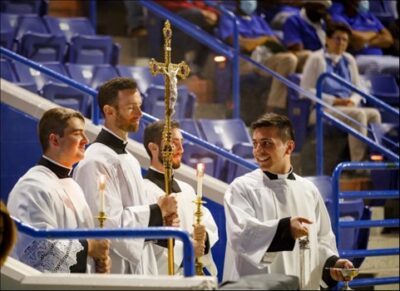
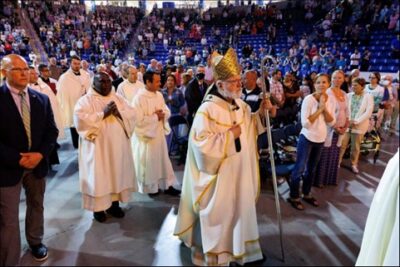
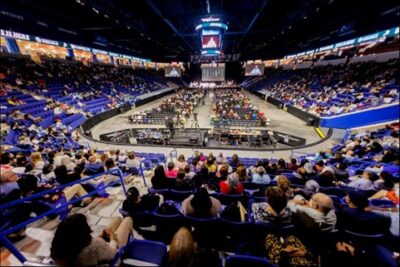
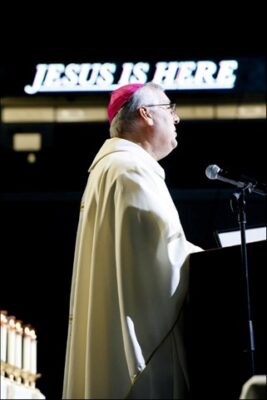
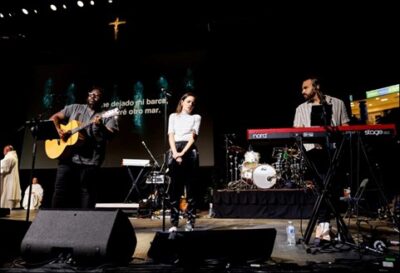
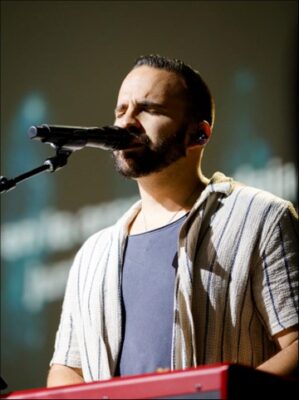
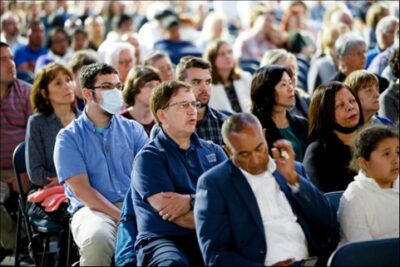
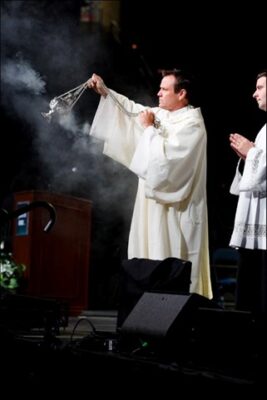
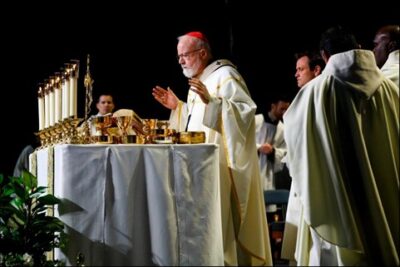
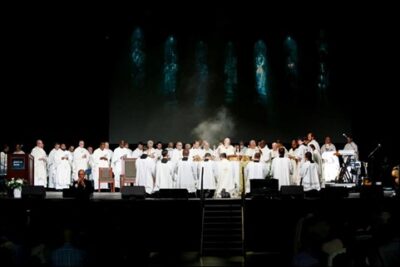
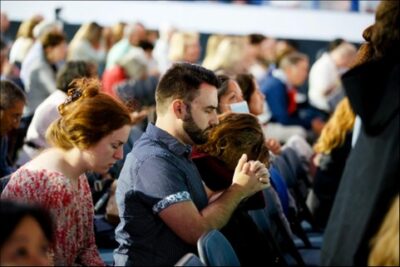
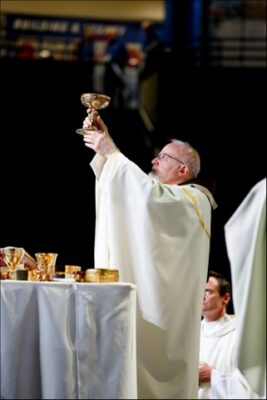
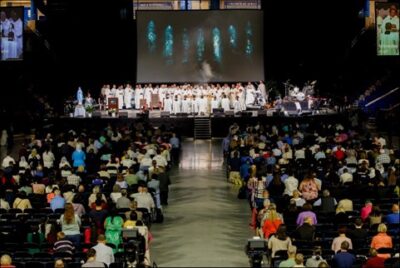
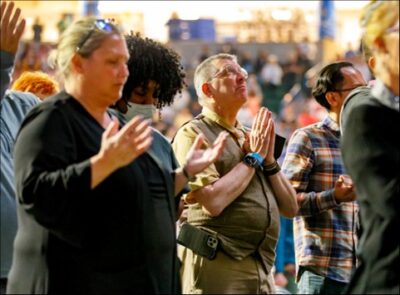
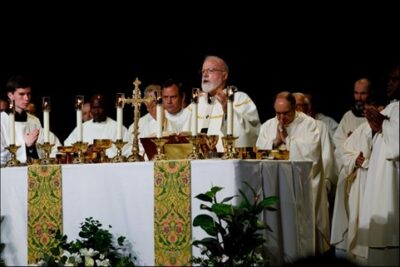
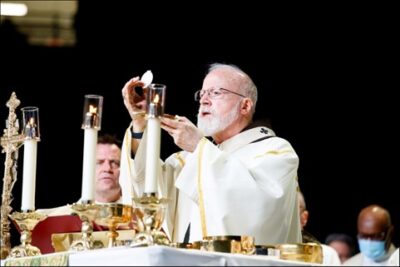
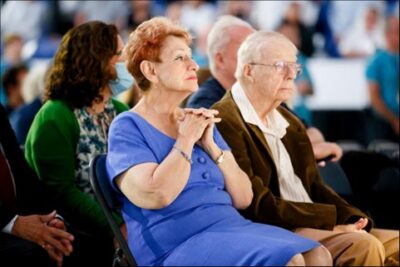
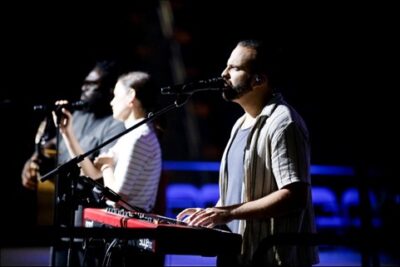
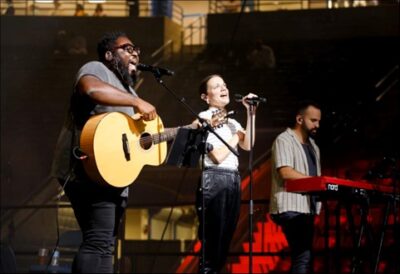
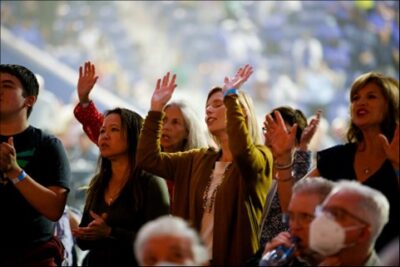
It was a wonderful day that included Mass, inspirational music, confession, adoration and wonderful talks by Bishop Flores, Deacon Burke-Sivers and Jackie and Bobby Angel.
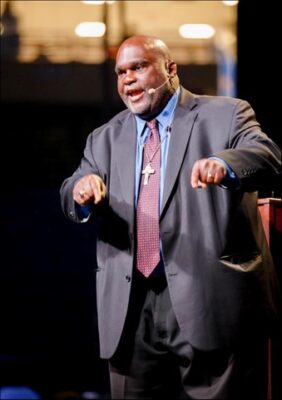
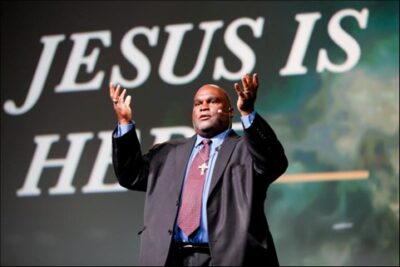
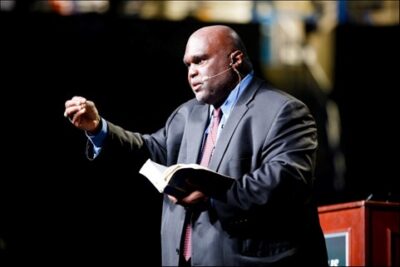
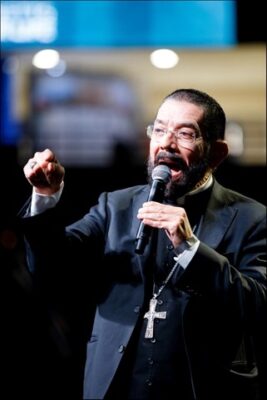
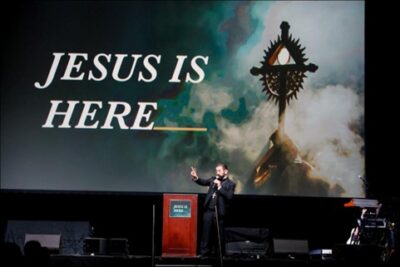
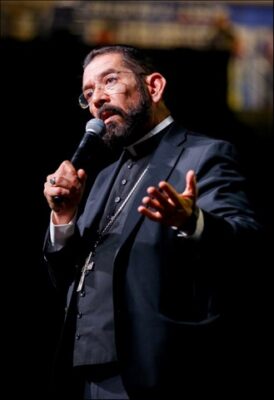
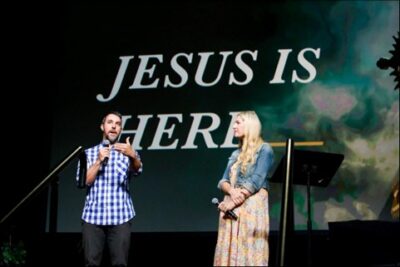
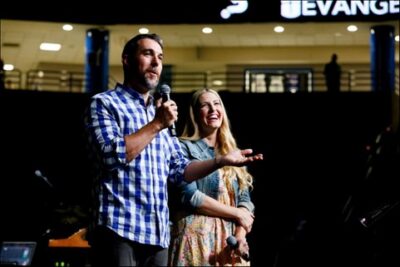
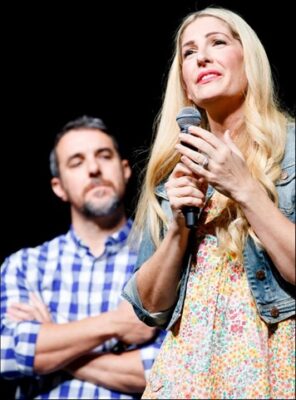
We are very happy that Cardinal Antoine Kambanda from Rwanda was able to join us for the conference, and when I began my talk, I invited him to join me on stage and to offer some remarks to the people.
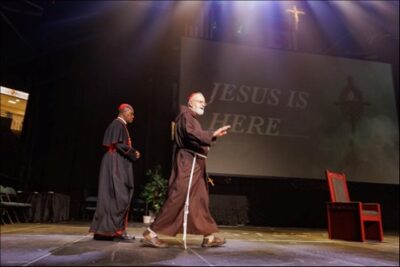
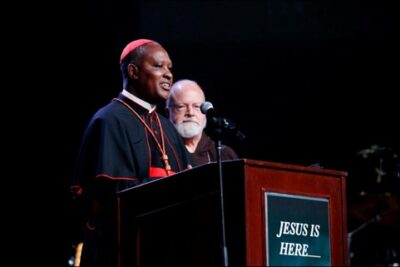
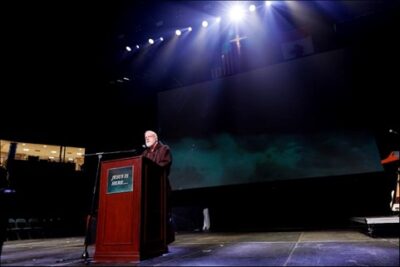
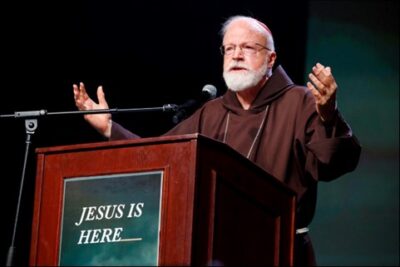
The day concluded with a time of adoration and a procession from the Tsongas Center to St. Patrick’s Church, where we had the benediction.
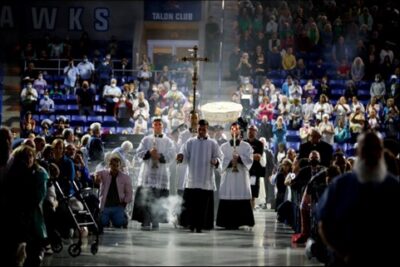
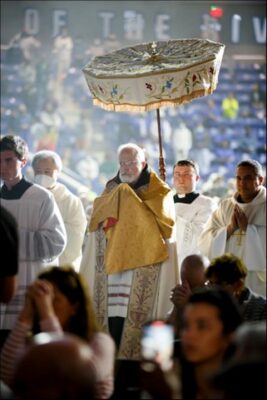
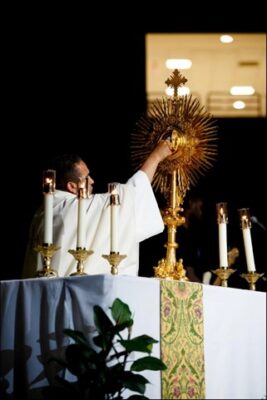
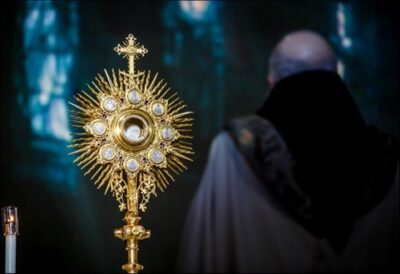
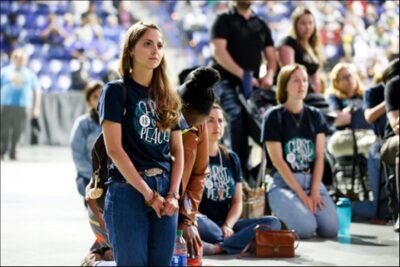
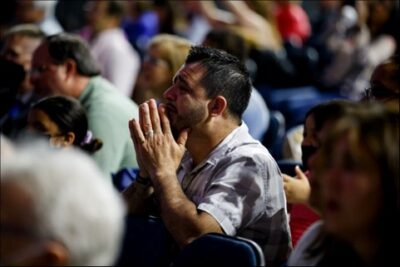
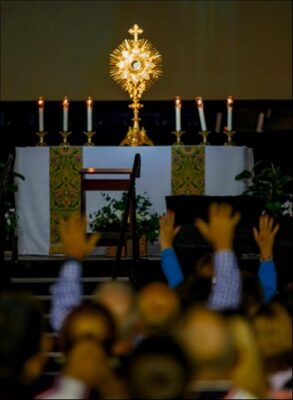
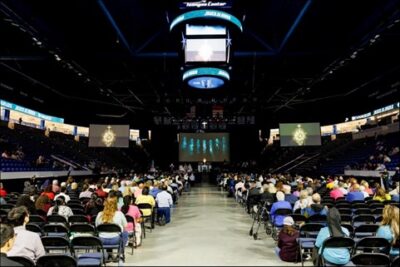
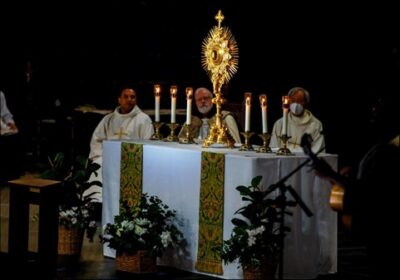
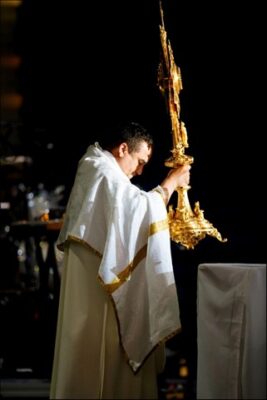
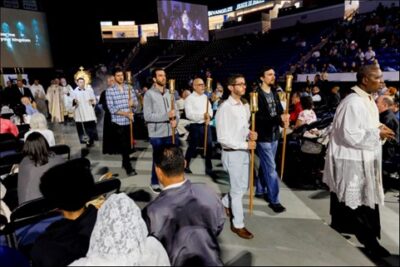
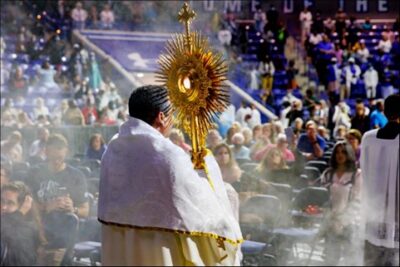
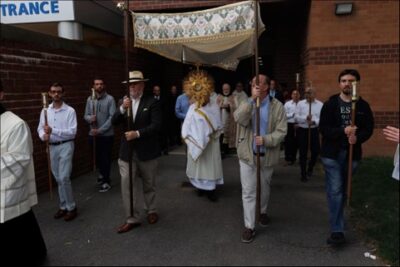
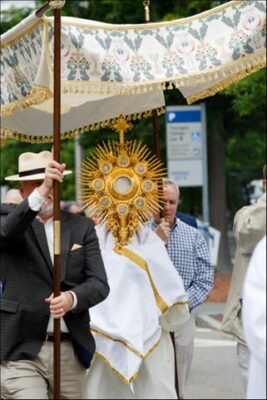
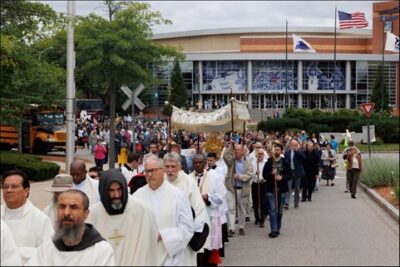
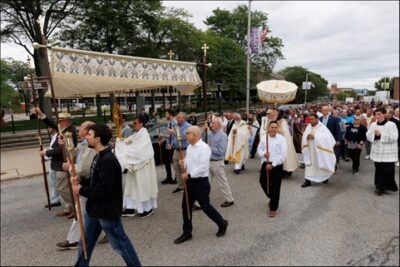
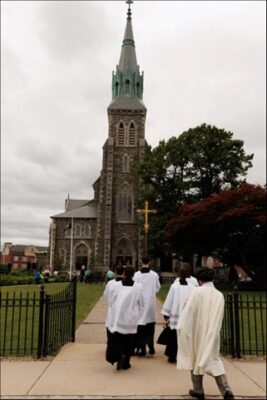
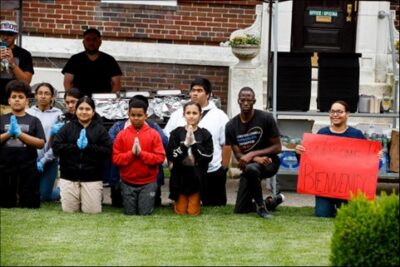
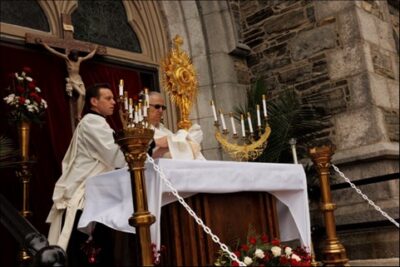
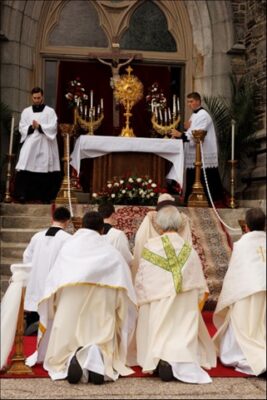
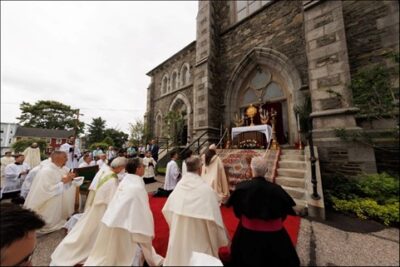
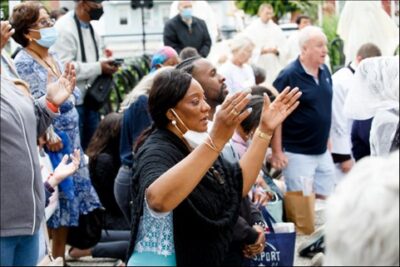
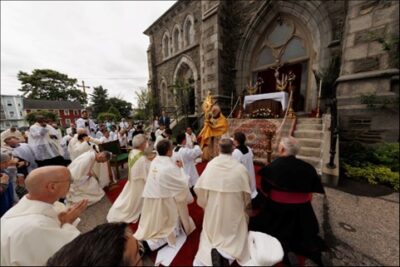
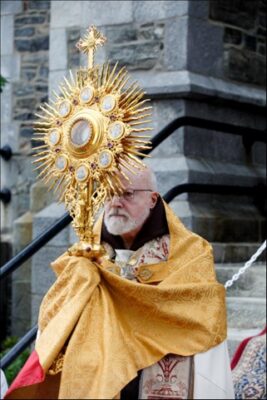
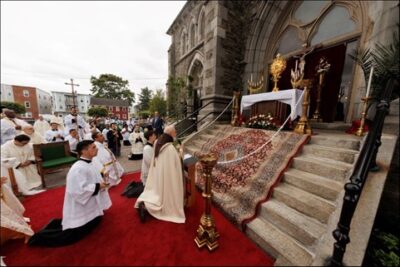
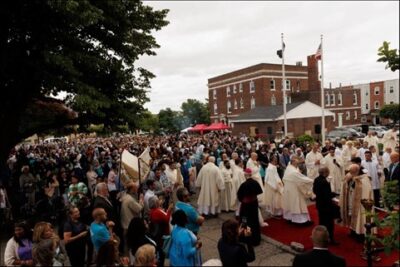
This was the culmination of a great deal of planning, and we are so grateful to Father Paul Soper and his team, who did so much to make the day come together. We are also very grateful to the Lowell Police Department for all their help with the procession.
Of course, in this post-pandemic time, our efforts have to be focused on inviting people back to participation in the Sunday Eucharist, and the Eucharistic Congress was an important element in this effort. And, of course, having it on the week of Corpus Christi was beautiful because, after the events Friday at the Cathedral and Saturday in Lowell, many people were back in their parishes for processions and other Eucharistic activities.
Sunday, I celebrated the Mass for the Feast of Corpus Christi at the cathedral.
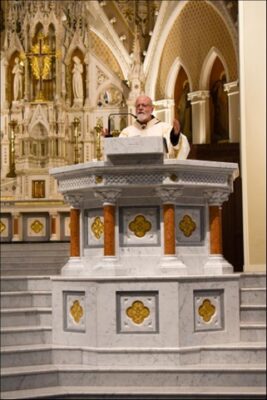
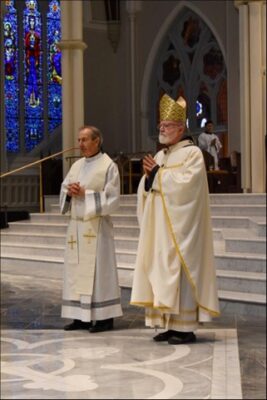
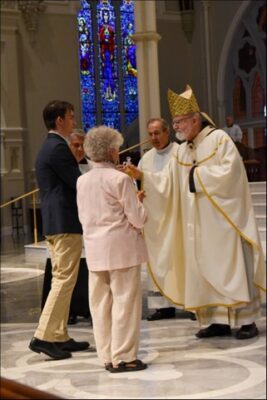
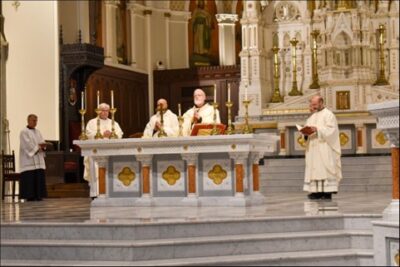
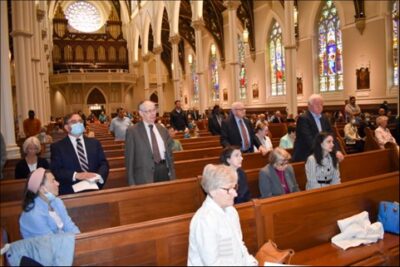
With us were a number of members of the Guild of Saint Luke of Catholic physicians because the Mass was being offered for their members who served during the pandemic, especially those who lost their lives to COVID.
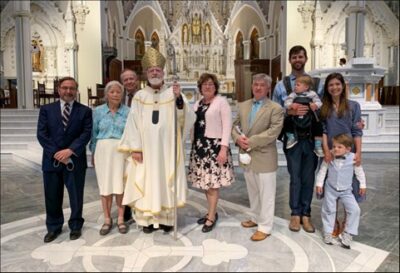
After the Mass, we gathered in the Blessed Sacrament Chapel for the ceremony of the promotion of officers of the Order of the Holy Sepulchre’s Northeast Lieutenancy. Normally, the promotions would have been conferred at a national gathering, but because of the pandemic, it was decided that each lieutenancy should hold its own local celebration.
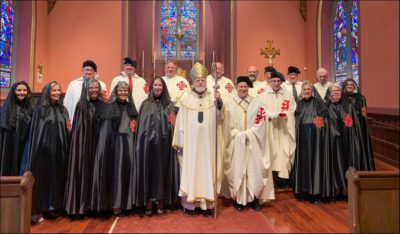
The Order of the Holy Sepulchre is one of the oldest organizations in the Church. It was once a military order that protected the sacred places in the Holy Land. In the modern era, it has evolved into an organization that supports the Church there, with a focus on supporting the works of mercy, evangelization and education, as well as the support of the holy sites.
Monday, we had a virtual meeting of the Council of Cardinals advising the Holy Father on the reform of the Roman Curia. The meeting was originally planned to be in person, but it was switched to a virtual format because the Holy Father was expected to be traveling.
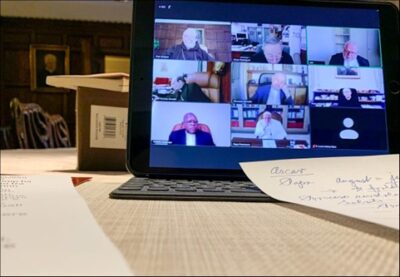
Though the Holy Father has canceled those trips and Cardinal Parolin is going to take his place in the Democratic Republic of Congo and South Sudan, we are very pleased that he is doing much better. He is walking again, and perhaps he will be able to travel at the end of July, though no decision has been made yet on that.
On Tuesday, we had our last meeting of the board of St. John’s Seminary before the summer.

We heard many positive reports, particularly on the large number of ordinations, not just for the Archdiocese of Boston but from the other dioceses, as well. We are very grateful for the fine work of the rector, Father Stephen Salocks, and the faculty and staff of the seminary.
Wednesday, we celebrated a Mass here at the Pastoral Center for priests celebrating their 25th and 50th jubilees of ordination or religious life.
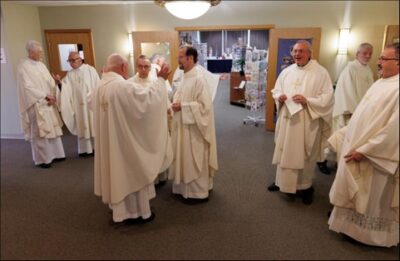
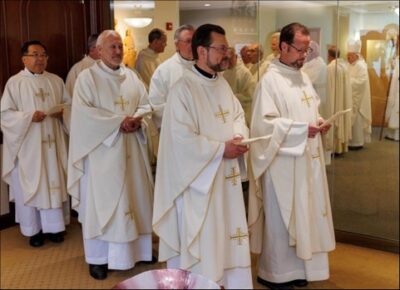
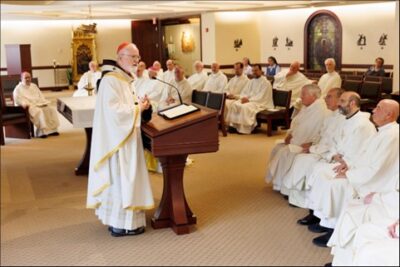
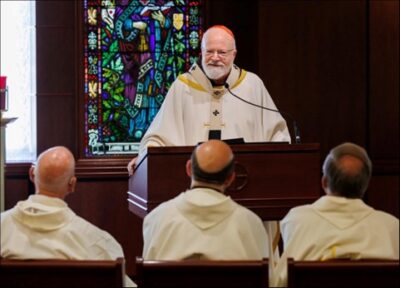
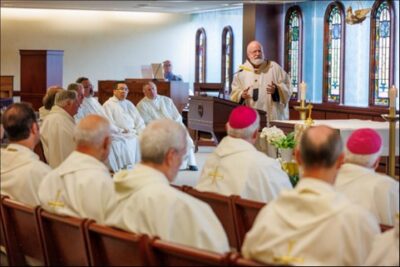
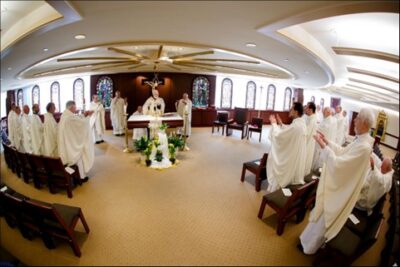
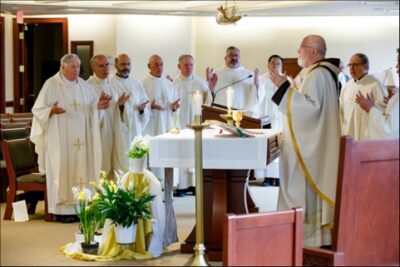
Those priests celebrating their 25th jubilees this year are Father David Barnes, Father Kenneth Cannon, Father John Carmichael, Father Brian Clary, Father John Currie, Father Michael Della Penna, OFM; Father Carlos Flor; Father Michael Hobson; Father Robert Kickham; Father Joseph MacCarthy; Father Enzo Gustavo Morello, SJ; Father Joseph Mozer; Father Kenneth Overbeck; Father Thomas Sheehan, SJ; Father Peter Shen; and Father John R. Siberski, SJ.
The 50th jubilarians are Father Ronald Calhoun; Father Charles Collins; Father John Culloty; Father Daniel Finn; Father Alphonse Ferreira, OFM; Father Gerald Fraser; Brother Charles Gamen, OCD; Father Thomas Garone, OFM; Father Kenneth R. Himes, OFM; Father William Joy; Father Paul Kenney, SJ; Father Thomas Kopp; Father Donald A. MacMillan, SJ; Father Frederic A. Maples, SJ; Father Edward Malone; Msgr. Paul McInerny; Father Paul Miceli; Abbott Thomas O’Connor, OSB; Father Peter Quinn; Father Walter J. Smith, SJ; and Father James F. Walsh, SJ.
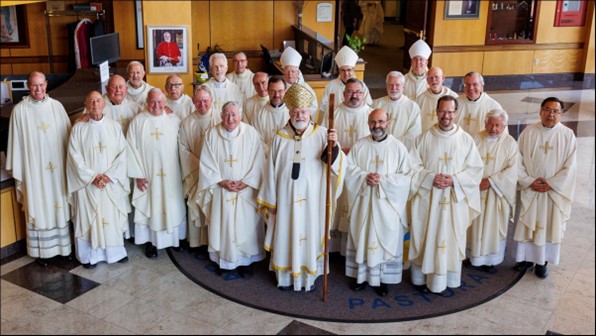
Of course, not all of them were able to join us for the Mass, but we are very pleased that many of them were.
Afterward, we shared a very nice lunch together. It was an opportunity to express our congratulations and thanks to our jubilarians.
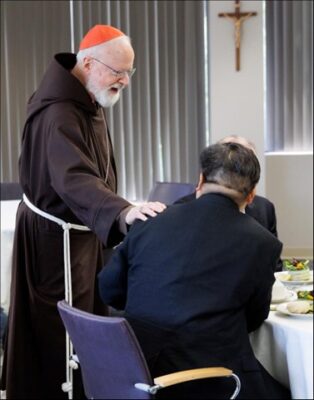
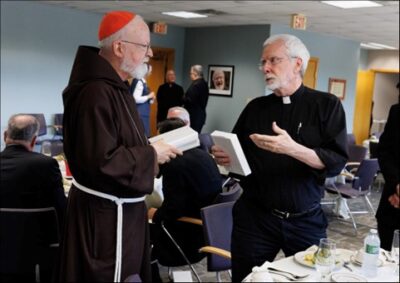
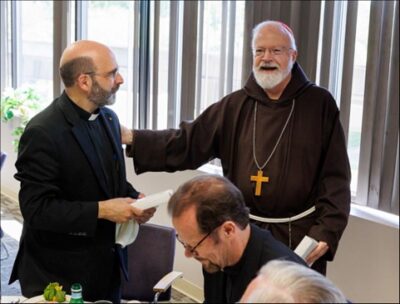
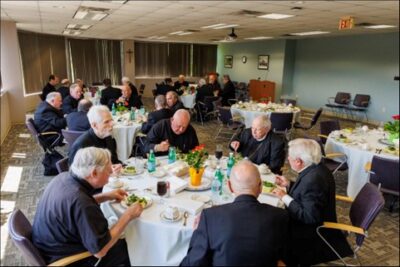
Thursday, I gathered at the Pastoral Center with the major superiors of men’s and women’s religious congregations in the archdiocese for lunch and a time of dialogue.
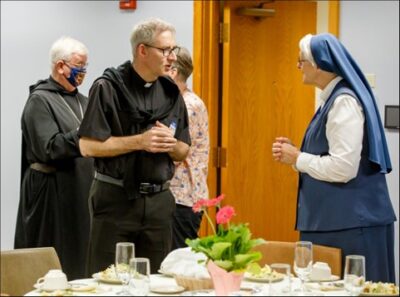
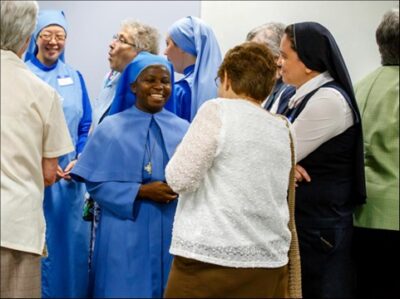
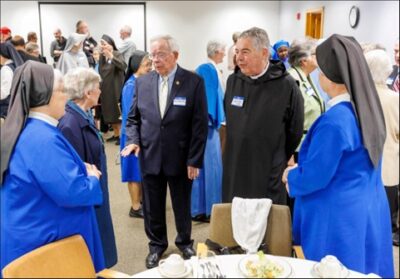
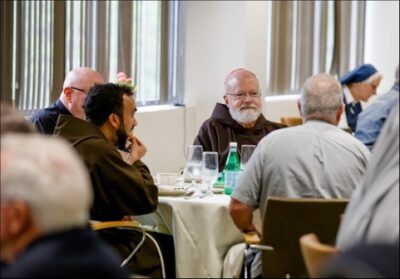
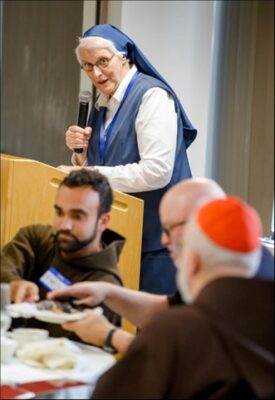
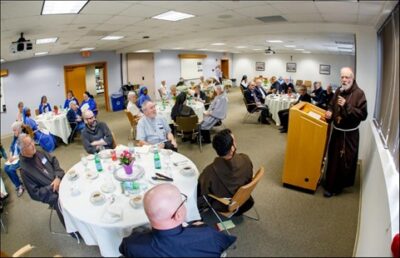
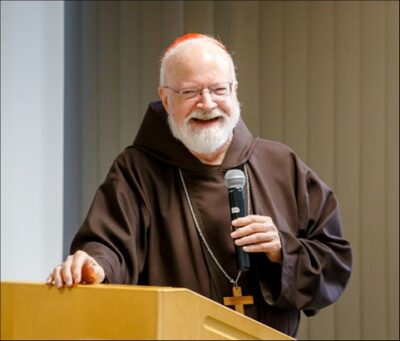
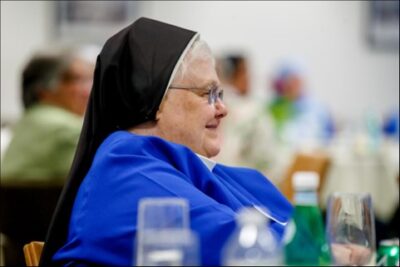
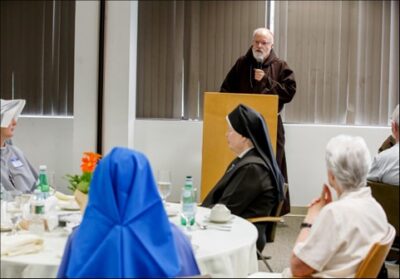
The archdiocese is blessed with so many religious communities that bring their charisms and spirituality to enrich our local Church. So many of the very important initiatives — pastoral, educational and social — in the archdiocese exist because of the religious communities that have founded and staffed so many of our schools, ministries and apostolates. We are so grateful to our Delegate for Religious, Sister Germana Santos, for her hard work in making this gathering so successful.
Thursday afternoon, I went to Regina Cleri for the wake of Father Thomas Buckley. I had visited him last week and it was the last opportunity I had to see him and pray with him before he passed away.
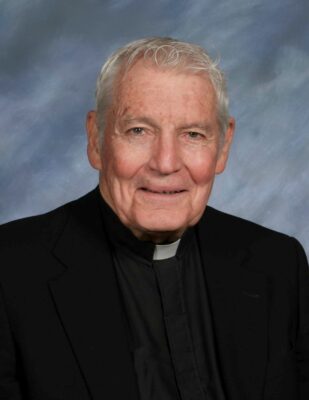
He had a long and beautiful life. In addition to his fine parish service, Father Buckley was a distinguished Scripture scholar, and he was beloved by his students and those who came to know him in the parishes. He was a delightful person, and I always described him as the quintessential New England gentleman. He will be sorely missed.
Until next week,
Cardinal Seán
